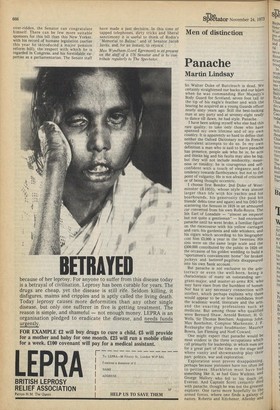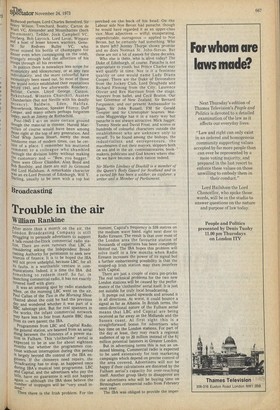Panache
Martin Lindsay
So Walter Duke of Buccleuch is dead. We certainly straightened our backs and our bOws when he was commanding Her Majesty!s Body Guard for Scotland, seven foot tall to the tip of his eagle's feather and with the bearing he acquired as a young Guards officer nearly sixty years ago. Still the best-looking man at any party and at seventy-eight ready to dance till dawn, he had style. Panache. I have been asking myself who else had this rare quality, to take only those who have spanned my own lifetime and of my own country. It is apparently so hard to define that neither the Oxford Dictionary nor its French equivalent attempts to do so. In my own definition a man who is said to have panache has presence, people ask who he is; he acts and thinks big and his faults may also be big, but they will not include mediocrity, meanness or timidity; he is courageous and selfconfident with a touch of elegance and a tendency towards flamboyance, but not to the point of vulgarity. He is not afraid of criticism or of being thought eccentric.
I choose first Bendor, 2nd Duke of Westminster (a.1953), whose style was almost larger than life with his yachts and his boarhounds, his generosity (he paid his friends' debts time and again) and his DSO for scattering the Senussi in 1916 in an armoured car converted from his own Rolls-Royce. The 5th Earl of Lonsdale — "almost an emperor but not quite a gentleman" — had enormous panache until he went broke, a familiar figure on the racecourse with his yellow carriages and cars, his gardenia and side whiskers, and his cigars which according to his biographer cost him 0,000 a year in the 'twenties. His sins were on the same large scale and the 000,000 contributed by the public in 1928 on the occasion of his golden wedding to build a "sportsmen's convalescent home" for broken jockeys and battered pugilists disappeared into his own bank account.
But panache is not exclusive to the aristocracy or even the well-born, being a characteristic of many an outstanding sergeant-major, and master-at-arms RN, who may have risen from the humblest of homes. Nor has it any necessary connection with intellect, which perhaps explains why there would appear to be so few candidates from the academic world, literature and the arts, and the exacting professions such as medicine. But among those who qualified were Bernard Shaw, Arnold Bennet, H. G. Wells, Sir Thomas Beecham, Augustus John. Max Beerbohm, Compton Mackenzie, J. F. Roxburghe the great headmaster, Maurice Bowra, Ian Fleming and Noel Coward. One might expect that panache would be most evident in the three occupations which call primarily for leadership, in which men are for a great part of the time on the stage and where vanity and showmanship play their part: politics, war and exploration. Exploration soon proves disappointing. perhaps because jealousies have too often led to pettiness. Shackleton must have had something like it, as had Gino Watkins, and George Mallory who fell to his death on Everest. And Captain Scott certainly died with panache, though he was not the greatest
explorer. One turns more hopefully to the armed forces, where one finds a, galaxy of
names: Roberts and Kitchener, Allenby and
Birdwood perhaps, Lord Charles Beresford, Sir Henry Wilson, Trenchard, Beatty, Carton de Wiart VC, Alexander and Mountbatten (both pre-eminent), Tedder, Jock Campbell VC, Freyberg, Bob Laycock, Lord Lovat. Wingate and a host of lesser known warriors. General Sir Redvers Buller VC, who never missed his bottle of champagne tor dinner even when campaigning on the veldt, strangely enough held the affection of his troops through all his reverses. In politics there is nowadays less scope for eccentricity and idiosyncrasy, or at any rate individuality, and the more colourful have Increasingly been eased out. So most of those one would notice established their reputations beforf 1945, and few afterwards: Rosebery, Balfour, Carson, Lloyd George, Curzon, Birkenhead, Winston Churchill, Austen Chamberlain (but not Neville with his deadly decency), Baldwin, Eden, Halifax, Beaverbrook, Maxton, Speaker Fitzroy, Duff Cooper, and many others perhaps forgotten today, such as Jimmy de Rothschild.
Post-1945 I an on more certain ground though the mateeial is thinner. Harold MacMillan of course would have been among those right at the top of any generation. And Chief Whip James Stuart, surely the most handsome man of modern times, can be certain of a place. I remember his muttered Comment to a colleague who shambled through the division lobby without making the customary .nod — "Bow, you bugger." There were Oliver Chandos, Alan Boyd and Bob Boothby, and there are still Jo Grimond and Lord Hailsham. A remarkable character as an ex-Lord Provost of Edinburgh, Will Y. uarling, usually to be seen with a top hat perched on the back of his head. On the Labour side Nye Bevan had panache. though he would have regarded it as an upper-class vice. Most adjectives — wilful, exasperating, unpredictable, outrageous — applied to Nye Bevan, but he certainly had something. Who is there left? Jeremy Thorpe shows promise and so does Norman St. John-Stevas. But these are not a lot of names for three decades.
Who else is there, who is alive today? The Duke of Edinburgh, of course. Panache is not appropriate to youth, but Prince Charles may well qualify in time. Nor is it a feminine quality or one would name Lady Diana Cooper. There are the Duke of Devonshire from the Jockey Club, Lord Drogheda and Richard Fleming from the City, Laurence Olivier and Rex Harrison from the stage. Nureyev from ballet, and Cecil Beaton. Our last Governor of New Zealand, Sir Bernard Fergusson, and our present Ambassador to Spain, Sir John Russell, FM Sir Gerald Templer and Sir Chr4stopher Soames. Malcolm Muggeridge has it in a nasty way but panache is not always attractive. Mick Jagger, Tommy Steele and David Frost. and scores or hundreds of colourful characters outside the establishment who are unknown only to myself. To be found among the bishops, the industrialists and entrepreneurs, the macebearers if not their mayors, skippers both on sea and in the air, commissionaires, bookmakers, publicans and God knows where else. Or we have become a drab nation indeed.
Sir Martin Lindsay of Dowhill is a member of the Queen's Body Guard for Scotland and in a varied life has been a soldier, an explorer, a writer and a Member of Parliament.



































 Previous page
Previous page